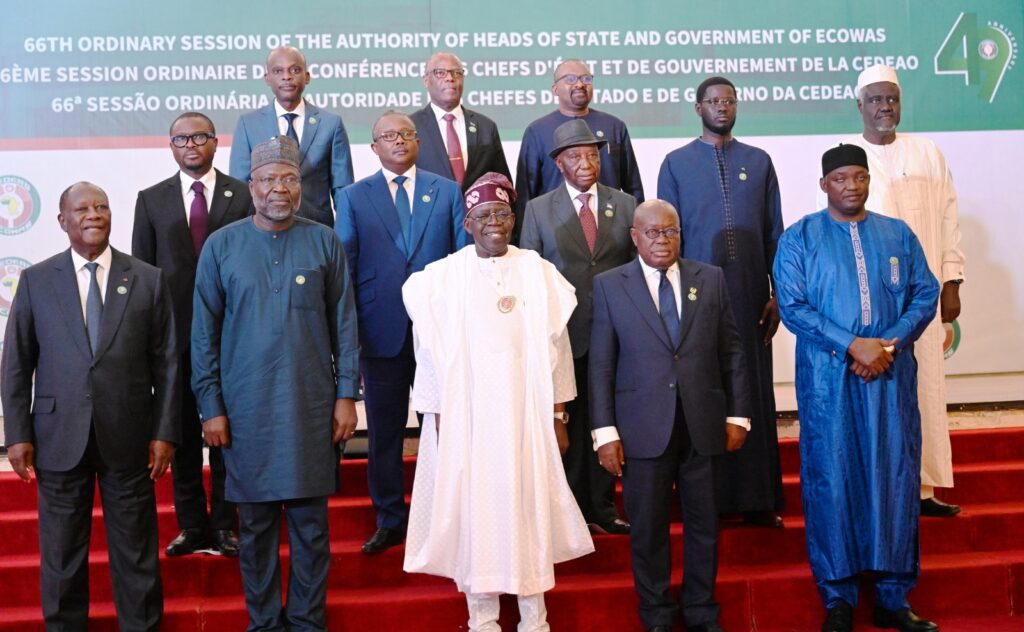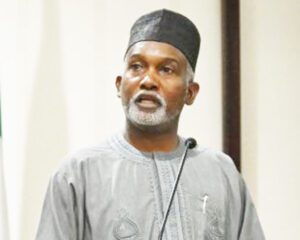
FG clears 100% ECOWAS levy, pays N85bn, first time in 19 years
…As Niger, Mali, Burkina Faso say ECOWAS exit is irreversible
By Seun Ibiyemi and Sodiq Adelakun
In a historic move, Nigeria has made its first full payment to the Economic Community of West African States (ECOWAS) in 19 years, contributing N85.54 billion and $54 million for the 2023 levy and part of 2024. This payment marks a significant step in Nigeria’s commitment to the ECOWAS community and its leadership role in West Africa.
President of the ECOWAS Commission, Omar Touray, made the announcement during the 66th ordinary summit of ECOWAS, held in Abuja on Sunday, December 15, 2024.
Speaking at the summit, Touray hailed the payment, calling it “a vote of confidence” in the organisation and a demonstration of Nigeria’s leadership under President Bola Tinubu.
“For the first time in 19 years, Nigeria has paid 100% of its community levy from 2023. I am therefore pleased to announce that on Friday, December 13, 2024, Nigeria paid N85 billion and $54 million, representing 100% of the 2023 levy and the 2024 levy up to July 2024,” said Touray. “We all agree that this payment underscores the leadership and commitment of President Tinubu, the government and the people of Nigeria to our community. At a more personal level, it represents confidence in the management I have been privileged to lead since 2022.”
President Tinubu, in his address at the summit, called on all leaders in the region to draw inspiration from Ghana’s recent peaceful elections, which he described as a model of democratic maturity. He praised President Nana Akufo-Addo and the people of Ghana for their successful presidential and parliamentary elections, urging all countries in the region to prioritise national unity and political stability.
“I urge all of us in the region to learn from this good democratic practice and prioritise our country’s national unity to ensure political stability of the region so that this manner of peaceful transition becomes the culture of democracy not only in West Africa but also in the entire Africa continent,” President Tinubu stated.
Tinubu also acknowledged the political maturity demonstrated in Ghana, referring to the concession of defeat by Vice President Mahamudu Bawumia, a leading presidential candidate. “This gesture, as it happened in Nigeria in 2015, demonstrates political maturity and respect for the will of the people of Ghana,” he added.
The Nigerian President also praised his Ghanaian counterpart, President Akufo-Addo, for his exceptional leadership and unwavering commitment to ECOWAS. He congratulated the government and people of Senegal on their successful parliamentary elections and wished Ghana’s Foreign Minister, Shirley Ayokor Botchwey, success in her new role as Secretary General of the Commonwealth.
In his speech, President Tinubu highlighted achievements from his first term as ECOWAS Chair, such as advancements in regional integration, economic growth, conflict resolution, and counterterrorism efforts. He noted that the ECOWAS Trade Liberalisation Scheme (ETLS) and Common External Tariff (CET) have strengthened trade and economic cooperation within the region.
“Similarly, regional infrastructure projects such as the West African Gas Pipeline, the West Africa Power Pool, and modernising key border posts have significantly enhanced connectivity and promoted greater regional integration,” Tinubu said. “Our efforts in stabilising our region through peacekeeping missions in the Gambia, Guinea-Bissau, Liberia, and Sierra Leone have demonstrated our capacity to act decisively in the face of adversity.”
The President also discussed the ECOWAS Regional Action Plan on the Fight Against Terrorism, a comprehensive framework to combat violent extremism and enhance regional security. As the bloc nears its 50th anniversary in 2025, Tinubu urged member states to recommit to the founding ideals of economic integration, peace, and prosperity.
“As a regional community, we must maintain our fundamental responsibility: to protect our citizens and create an enabling environment where they can prosper. Security is not a luxury but a necessity. Enhancing the living standards of our people is not an aspiration but an obligation,” Tinubu concluded.
The summit was attended by the Presidents of Côte d’Ivoire, Ghana, The Gambia, Guinea-Bissau, Liberia, and Senegal, alongside the Vice President of Sierra Leone, the Finance Minister of Benin, the Foreign Minister of Togo, and the Ambassador of Cape Verde to Nigeria.
The historic payment by Nigeria is a significant step in reinforcing the country’s commitment to ECOWAS and its leadership role in regional integration and stability.
…As Niger, Mali, Burkina Faso say ECOWAS exit is irreversible
Meanwhile, the military-led governments of Niger, Mali, and Burkina Faso have announced their decision to withdraw from the Economic Community of West African States (ECOWAS), describing the move as “irreversible.”
In a joint statement, the three Sahel nations accused ECOWAS of serving the interests of France, their former colonial power and pledged to chart a new path for their citizens.
The announcement precedes a key ECOWAS summit scheduled for Sunday, where regional leaders had hoped to negotiate a resolution to retain the three nations within the bloc.
However, Niger, Mali, and Burkina Faso have shown no intention of participating in the meeting. Instead, ministers from the trio convened in Niger’s capital, Niamey, to reaffirm their commitment to completing the withdrawal process.
“The ministers reiterate the irreversible decision to withdraw from ECOWAS and are committed to pursuing a process of reflection on the means of exiting in the best interests of their peoples,” the statement read.
In a geopolitical shift, the three nations have established a new bloc — the Alliance of Sahel States (AES) — to replace ECOWAS.
This move signals a break from France’s influence and reflects growing ties with Russia, further reshaping the region’s diplomatic and economic landscape.
The decision to withdraw from ECOWAS raises concerns about the potential disruption to regional trade and mobility.
ECOWAS facilitates free movement of goods, people, and capital across its member states while also operating under a shared currency, the CFA franc.
Experts warn that the departure of Niger, Mali, and Burkina Faso could complicate economic integration, particularly in the volatile Sahel region.
The tension between ECOWAS and these nations escalated after the bloc imposed sanctions on Niger following a coup in July 2023, marking the sixth military takeover in the region within three years.
ECOWAS also threatened military intervention to restore civilian rule in Niger, a move that was strongly opposed by the three nations.
While ECOWAS regulations stipulate a 12-month notice period for withdrawal — meaning the exit will not be formalised until January 2025 — the three countries appear resolute in their decision.
ECOWAS commissioner for Political Affairs, Peace, and Security, Abdel-Fatau Musah, acknowledged the seriousness of the situation in an exclusive interview with BusinessDay Newspapers, warning of “profound economic, political, and security implications.”
ECOWAS is intensifying diplomatic efforts to bring the three countries back into the fold, appointing Senegal’s Bassirou Diomaye Faye as a mediator.
According to him, the bloc is also preparing contingency plans should negotiations fail by the January 2025 deadline.
“We are not enemies. We have had differences, but these can be resolved,” Musah said, adding that ECOWAS remains open to reconciliation.
However, he cautioned that withdrawal could have significant consequences, including disruptions to regional trade and security cooperation.
Musah emphasised that leaving ECOWAS would subject Niger, Mali, and Burkina Faso to trade tariffs and regulatory hurdles, potentially harming local economies.
“Products that originate from any of our member states go into other countries tariff-free. With withdrawal, this benefit is lost, posing risks to businesses and consumers alike,” he explained.
The withdrawal comes at a time when West Africa is grappling with severe security challenges, including terrorism and violent extremism.
Groups like Boko Haram and affiliates of Al-Qaeda and ISIS have destabilised the Sahel, making regional cooperation critical.
ECOWAS recently launched a counter-terrorism force of 1,700 troops to combat these threats but faces challenges in maintaining unity amidst growing divisions.
Musah highlighted the need for ECOWAS to address underlying issues such as poverty and marginalisation, which fuel extremism.
“The fight against terrorism must go hand in hand with efforts to improve living conditions, education, and healthcare,” he said.
Despite the challenges, Musah expressed optimism about the bloc’s ability to navigate these turbulent times.
“The doors of ECOWAS will always remain open. Unity is vital for the future prosperity of West Africa,” he said.
Political analysts believe that as the January 2025 deadline approaches, the region remains at a crossroads, with the potential withdrawal of Niger, Mali, and Burkina Faso set to redefine the political and economic landscape of West Africa.




